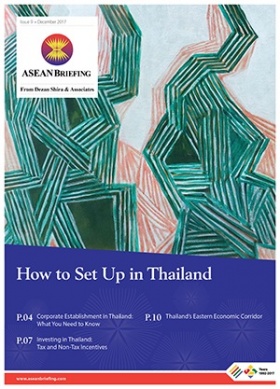Banking Sector Reforms in Myanmar
In a long-awaited move, Myanmar’s government recently permitted seven of the 13 foreign banks operating in Myanmar to provide export-financing services. This puts the foreign banks at par with their local counterparts, and provides additional options for local businesses to access credit at more competitive rates.
The decision is a welcome development as Myanmar’s banking system has been highly restrictive for foreign players. Besides providing export financing services, the select foreign banks will be allowed to extend credit to foreign businesses as well as local banks.
While foreign banks may cooperate with local lenders to offer additional services, they will continue to be prohibited from pursuing retail operations, such as opening of saving accounts, local money transfers, and extending loans in local currency.
Overall, Myanmar’s banking sector is in its formative stages of development – bank loans in the nation of 51 million comprise a mere 19 percent of its GDP, far below other emerging economies like Vietnam (36 percent) and Cambodia (108 percent).
![]() RELATED: Corporate Establishment Services from Dezan Shira & Associates
RELATED: Corporate Establishment Services from Dezan Shira & Associates
Myanmar’s banking reforms
Reform of Myanmar’s banking sector began in 2011 when the government permitted private banks to conduct foreign exchange transactions and set up ATMs across the country.
In 2012, the government approved the Foreign Exchange Management Law, followed by the enactment of the Central Bank of Myanmar (CBM) Law in 2013. The latter established the autonomy of the CBM as the licensing authority and regulator of all banks in Myanmar. Several other banking regulations followed.
In 2014, the CBM granted a provisional license to nine successful bidders, permitting them to carry out limited financial services in the country.
Two years later, four more overseas banks were granted a license, increasing the total number of foreign lenders authorized to operate in Myanmar to 13. The inclusion added over MMK1.6 trillion (US$1.2 billion) in combined regulatory capital to the system, tripling government revenue.
Finally, the Financial Institutions Law of Myanmar, passed in January 2016, represented a major step towards modernizing the sector. The law established governing regulations for both domestic and foreign financial institutions. It also attempted to level the playing field between private and state-owned banks and confirmed the CBM’s regulatory powers over the banking sector.
Challenges
While these reforms are hailed as breakthroughs in improving Myanmar’s underdeveloped financial sector, the country’s preferential treatment of state-owned banks with limited capabilities and restrictions on foreign involvement in the sector remain major concerns.
International banks operate in the country through joint venture agreements with local banks or assist foreign-invested companies. Laws prohibit them from engaging in retail banking and direct lending in the local currency. In addition, these banks are restricted to just one branch per bank and are required to invest a minimum paid-up capital of US$75 million. Besides, banks in Myanmar function vastly below international standards. Citizens continue to be wary of the banking system, following a history of poor management under military rule till 2011.
This deep-rooted mistrust has made developing a formalized banking structure a major challenge for the government. Multiple demonetizations, which crippled the economy in the 1980s, followed by lack of government support, only worsened national confidence; 70 percent of rural Myanmar is still unbanked whereas only two percent of the population uses debit cards.
 RELATED: Myanmar’s Investment Outlook for 2018
RELATED: Myanmar’s Investment Outlook for 2018
Opportunities for investors
Micro-financing agencies
The strongest opportunity for foreign investors in the sector comes from the Myanmar Microfinance Supervisory Enterprise (MMSE), 2012. The MMSE has the authority to issue licenses to new micro-financing companies – both domestic and foreign – that want to establish themselves in the finance sector.
Within five years of operation, the MMSE has granted licenses to over 200 agencies. Most of these companies, however, work in urban areas. This leaves over 60 percent of the population unbanked or without access to financial services – but also serves up as potential for investment growth in the sector.
The United Nations Capital Development Fund estimates that the total demand for financing in Myanmar is almost US$1 billion – about four times more than the current supply.
Digitization of financial services
Banks in Myanmar currently operate under the traditional system of banking, with cash being a primary component in everyday transactions. However, as Myanmar moves towards digitization, prospects for firms providing digital financial solutions are on the rise.
India’s Infosys Limited and Myanmar-based ACE Data Systems Ltd have provided a software system for the digital transformation of the AGD Bank, which is a local player in the sector.
Long term prospects
Restructuring of state banks is a high priority in Myanmar’s economic reform agenda, which possibly entails offering a stake in the state banks to international investors in the long run. This, along with the sheer size of the potential market, presents huge opportunities for foreign investors.
Moving towards a liberalized sector
The government’s plan to increase privatization in the banking sector infuses hope for faster economic growth and improving financial status. The latest development allowing foreign banks to provide trade financing to local traders is a small but key step forward.
Considering the lack of liquidity in local private banks in Myanmar, this move offers much-needed relief to the trading community and provides a more conducive business environment. It is, however, only a first in a series of necessary reforms that must be pursued by the government to secure Myanmar’s appeal for foreign investors and the international banking sector.
About Us
ASEAN Briefing is produced by Dezan Shira & Associates. The firm assists foreign investors throughout Asia and maintains offices throughout ASEAN, including in Singapore, Hanoi, Ho Chi Minh City and Jakarta. Please contact us at asia@dezshira.com or visit our website at www.dezshira.com.
- Previous Article Laos’ Investment Outlook for 2018
- Next Article CPTPP and Opportunities for Businesses in ASEAN











